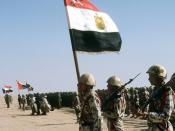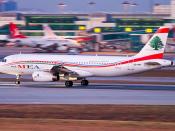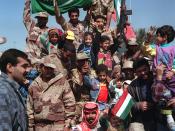U.S. Foreign 1 Running head: Reasons for Anti-American sentiment United States Foreign Policy in the Middle East Lindsey Brown Husson College U.S. Foreign 2 U.S. Foreign Policy in the Middle East On September 11, 2001, political terrorism was seen at its worst. The American soul, as sturdy as it seemed to be, was truly shaken as people all across the world watched as the Twin Towers went from two of the most amazing structures in the world to a mountain of rubble in the heart of New York City. It was a terrorist attack that instigated a climate of hate in the west towards those in the east. One could smell retaliation in the air against the Islamic rebels who are believed to be responsible for the most deadly terrorist attack ever. As people begin to catch their breath and process the information surrounding the attacks, one could only help but wonder how these religious and political rebels could justify taking thousands of innocent lives.
The fact of the matter is that the U.S. government is partially responsible for the September 11th terrorist attacks due to its political favoritism in the Middle East.
The United States government has a long political history with the Middle East, especially in the Persian Gulf area. What is in the Middle East that is absolutely essential to the people of the U.S.? Oil. After the Iranian Revolution, U.S. President Jimmy Carter issued a speech that declared: "An attempt by any outside force to gain control of the Persian Gulf region will be regarded as an assault on the vital interests of the United States of America [and] will be repelled by any means necessary, including military force." (Klare, 2001). This declaration, which was made in 1980, was the foundation for Operation Desert Storm, which...



Nice
I like the information you offered in this paper. the links you also provided are very helpful...
0 out of 0 people found this comment useful.